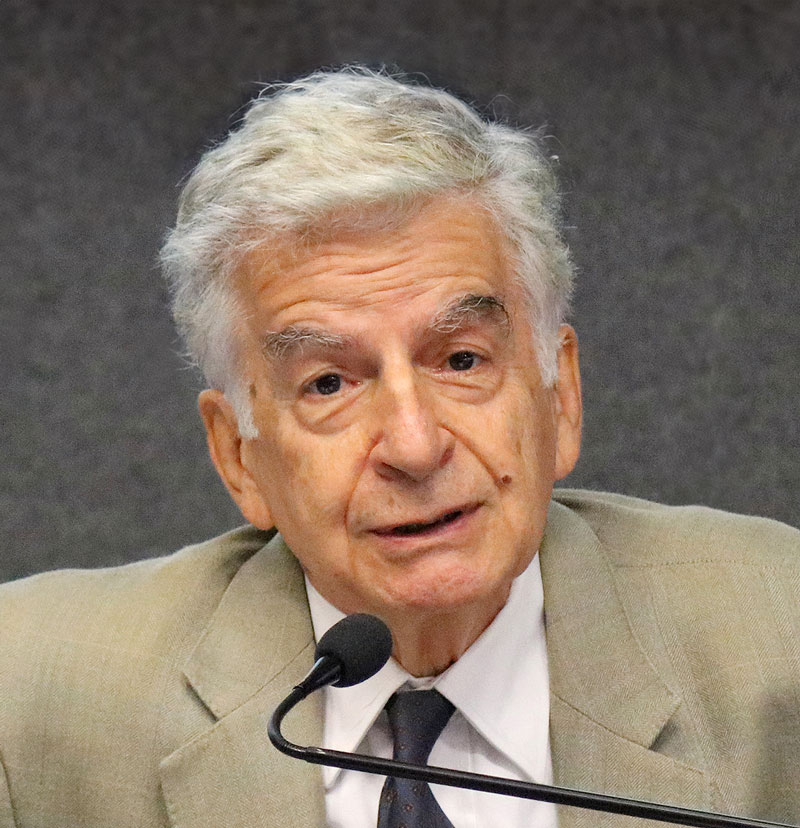
IEA/USPCandotti at a workshop held at USP in 2018: seeking to further the country’s developmentIEA/USP
Italian-Brazilian physicist Ennio Candotti was known for his involvement in collective projects that sought to improve the dissemination of science. He was a professor at the Physics Institute of the Federal University of Rio de Janeiro (IF-UFRJ) and later at the Federal University of Espírito Santo (UFES), where he retired in 2008. He was always driven by the idea that scientific education is key to the development of Brazil. After earning Brazilian citizenship in 1983, he put this notion into practice during four terms as president of the Brazilian Society for the Advancement of Science (SBPC), as founder and director of the Amazon Museum (MUSA), and by creating scientific communication channels. Candotti died in Manaus on December 6, at the age of 81.
Born in Rome, Italy, in 1942, Candotti immigrated to Brazil with his family at the age of 10. He received his degree in physics from the University of São Paulo (USP) in 1964, then returned to Europe to study theoretical physics at the University of Pisa (1966–1967) and the University of Naples (1970–1972) in Italy, and the University of Munich in Germany (1968–1969). In 1973, he taught at a high school in Milan and worked with popular Italian science magazine Sapere.
In 1974, he returned to IF-UFRJ in Brazil as an assistant professor. In the midst of the military dictatorship, he saw the organization of scientists as a way to carry out research in adverse times and began attending SBPC meetings. “One day, he and physicist Luiz Pinguelli Rosa [1942–2022] approached me to discuss the creation of a critical space for scientists themselves to discuss science,” says UFRJ neuroscientist Roberto Lent, then regional secretary of the SBPC. “I proposed the idea of creating a science magazine, through which our scientists could tell the general public about their achievements. Ennio not only took the idea onboard—he made it a reality.”
In 1982, Candotti launched Ciência Hoje (CH; “Science today”), and it was very successful. Ciência Hoje Crianças (CHC; “Children’s science today”), originally an insert in CH that was first included in 1986, became an independent magazine in 1990. “When Ennio suggested a science magazine for children, people laughed. But over the years, many scientists have told us that they chose their career because of CHC,” says physicist Alberto Passos Guimarães, president of the Science Today Institute (ICH).
Candotti was elected president of the SBPC in 1989 and reelected in 1991, 2003, and 2005. Under his leadership, the organization strengthened its regional divisions by mobilizing researchers to help establish several research-funding agencies. “Ennio was a whirlwind of innovative ideas, but also a director with a great capacity for coordination. He always encouraged people to work together, sometimes despite conflicting points of view,” recalls UFRJ physicist Ildeu de Castro Moreira, who was scientific editor of CH from 1988 to 1996 and president of the SBPC from 2017 to 2021.
At the 2007 SBPC Annual Meeting in Belém, Candotti put forward the idea of creating of a museum in the rainforest. Marilene Corrêa da Silva Freitas, then dean of the State University of Amazonas, later invited him to oversee the creation of the Amazon Museum (MUSA), which he directed until the day he died. The museum was founded in 2009 and ran programs in museology, research, education, and scientific, cultural, and ecological tourism related to the biomes and cultures of the Amazon region. “Candotti cared deeply about science’s place in the country’s national development,” says Freitas, chair of MUSA’s Board of Directors. “He fought for scientific inclusion because he believed that scientific knowledge is a democratic right for all people.”
Candotti leaves his wife, Maria Elisa da Costa Magalhães, who is a physicist, and a son, Fábio Magalhães Candotti, who is a sociologist.
Republish